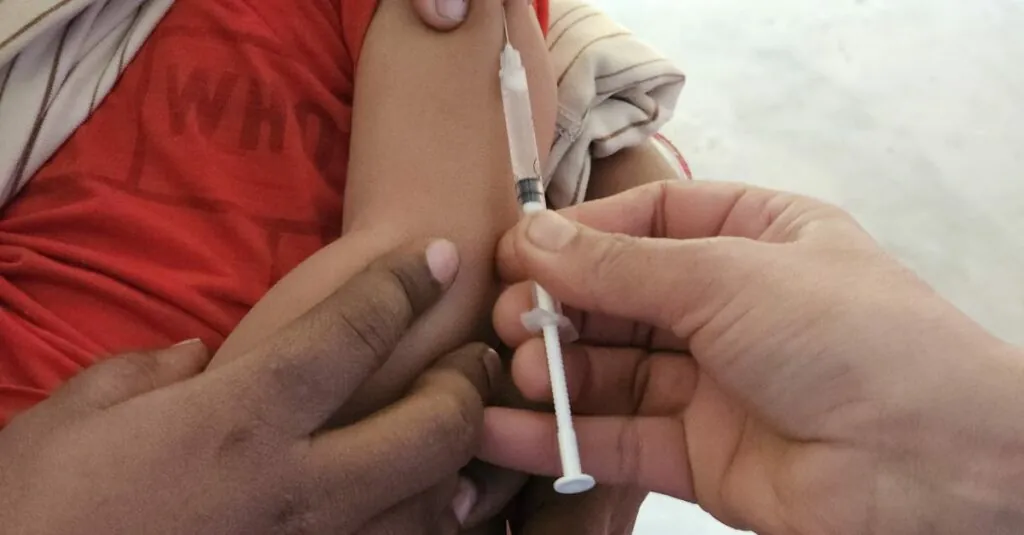Table of Contents
ToggleFinding the right daycare for little ones can feel like searching for a needle in a haystack. Parents want a place that’s not just safe but also fun, engaging, and educational. Enter YMCA daycare programs, where kids can unleash their inner superheroes while parents enjoy a well-deserved break.
Overview of YMCA Daycare Programs
YMCA daycare programs provide a nurturing and engaging atmosphere for children. These programs focus on social development, cognitive skills, and physical activities. Children participate in various age-appropriate activities that promote learning while ensuring fun.
Safety remains a top priority in YMCA facilities. Each program environment follows strict guidelines to ensure children’s well-being. Staff members undergo thorough background checks and receive extensive training in child development and safety protocols.
Curricula are designed to foster creativity and critical thinking. Activities often include arts, sports, science projects, and cooperative games. Interactive play encourages teamwork and builds social skills among peers.
Flexibility in scheduling accommodates parents’ diverse needs. Programs typically offer full-day, part-day, and drop-in options, making it easy for parents to find suitable arrangements.
Additionally, YMCA daycare programs emphasize community involvement. Parents can engage with staff and participate in family-oriented events. Inclusion fosters a sense of belonging and strengthens relationships within the local community.
Affordable pricing options make YMCA daycare accessible. Many centers provide financial assistance, ensuring families can access quality care without excessive burden. Parents can trust YMCA to prioritize both educational growth and emotional support for their children.
Benefits of YMCA Daycare Programs
YMCA daycare programs provide numerous advantages that benefit both children and parents. These programs create opportunities for children to grow socially and academically in a supportive environment.
Social Development
Social development thrives in YMCA daycare programs. Children interact with peers, building friendships and learning important social skills. Through group activities, they practice teamwork and communication. Engaging in cooperative games allows them to navigate emotions and resolve conflicts. Daily interactions with trained staff also help them develop trust and respect for others. The nurturing atmosphere encourages both individuality and collaboration, fostering a sense of belonging in a diverse community.
Educational Opportunities
Educational opportunities abound in YMCA daycare programs. Curricula focus on age-appropriate learning experiences, stimulating curiosity and creativity. Activities such as arts and crafts enhance fine motor skills while promoting self-expression. Structured playtime introduces fundamental concepts in math and science through hands-on experiments. Trained educators also incorporate language development activities, helping children build vocabulary and communication skills. Regular assessments ensure programs meet educational standards while adapting to individual needs, preparing children for future academic success.
What to Expect from YMCA Daycare Programs
YMCA daycare programs provide children with engaging experiences that promote their growth and development. Parents can expect a well-rounded approach that emphasizes safety, learning, and community involvement.
Daily Activities
Daily activities are designed to enhance children’s social and cognitive skills. Arts and crafts stimulate creativity while fostering fine motor development. Active play includes sports and cooperative games, allowing children to learn teamwork and take part in physical activities. Curricula incorporate structured playtime that introduces foundational math and science concepts. Additionally, language development activities help to expand vocabulary and communication skills. Regular assessments ensure that activities are adaptive to meet children’s individual needs.
Staff Qualifications
Staff qualifications play a vital role in YMCA daycare programs. All educators undergo extensive training to effectively support children’s developmental milestones. Staff-to-child ratios comply with safety regulations, ensuring personalized attention for each child. Communication with parents is prioritized, keeping them informed about their child’s progress and daily experiences. Ongoing professional development opportunities are available for staff, allowing them to remain current with best practices in early childhood education. These qualifications ensure children receive high-quality care in a nurturing environment.
Parent Involvement in YMCA Daycare Programs
Active parent involvement significantly enhances children’s experiences in YMCA daycare programs. Parents participate in various family-oriented events that foster community connections and reinforce learning. Through engagement, parents gain insights into their child’s daily activities and developmental progress.
Feedback opportunities arise regularly, allowing parents to communicate with staff about children’s needs and interests. Staff members encourage parents to share their strengths and talents, leading to collaborative projects that enrich the program. Parents often volunteer for special events, further promoting a sense of community and belonging.
Communication remains a priority, with regular updates provided through newsletters, emails, and parent-teacher conferences. These channels keep parents informed about upcoming events, educational initiatives, and opportunities for further engagement. Transparent communication builds trust and strengthens the partnership between families and the YMCA.
Community involvement takes various forms, including workshops and family nights, designed to enhance parenting skills and support children’s growth. Parents gain valuable resources and strategies from these gatherings, which they can implement at home. Additionally, YMCA daycare staff often host informational sessions that educate parents on child development and effective parenting techniques.
Feedback from parents also plays a crucial role in shaping program curricula. Their insights help tailor activities to align with the interests and needs of children, fostering a more enriching learning environment. This collaboration ensures that program offerings stay relevant, engaging, and beneficial.
Ultimately, parent involvement within YMCA daycare programs creates a rich, supportive atmosphere for children. Parents’ active participation not only benefits the children but also cultivates a strong, connected community that thrives on collaboration and support.
YMCA Daycare Programs in Different Locations
YMCA daycare programs are available in various locations, each offering unique features tailored to meet community needs. Urban centers often provide extended hours, accommodating parents with demanding schedules. Rural locations focus on outdoor activities, enhancing children’s connections with nature.
Each program maintains a commitment to safety and child development. Staff undergo rigorous training to ensure they meet local regulations and high educational standards. Programs emphasize age-appropriate curricula incorporating local cultural elements, fostering community pride.
Different locations implement flexible scheduling to adapt to diverse family requirements. Options include full-day care, part-day sessions, and drop-in services, allowing parents to choose what best suits their needs. Many centers also offer seasonal camps, providing additional learning opportunities during school breaks.
Community engagement plays a significant role in YMCA daycare programs. Locations host events like family nights and workshops, enhancing parents’ skills and encouraging strong familial connections. Feedback from parents helps shape the programs, ensuring they reflect children’s interests and community values.
Financial assistance is available at many YMCA locations, supporting families while maintaining program quality. Rates vary by region, ensuring that care remains affordable yet comprehensive. Local partnerships often enhance resources, providing additional educational materials and activities.
Enrichment activities differ by location, showcasing local art, culture, and recreational facilities. Outdoor play areas offer unique opportunities for physical activity, while indoor spaces promote creativity and curiosity through structured play. Educational trips to nearby museums or nature reserves expand children’s experiences, complementing in-center learning.
Overall, YMCA daycare programs across different locations ensure children receive quality care in a supportive environment, promoting both developmental growth and community connection.
Conclusion
YMCA daycare programs stand out as a valuable choice for parents seeking a well-rounded environment for their children. With a focus on safety social development and educational growth these programs cater to diverse family needs. The nurturing atmosphere encourages creativity teamwork and individual expression while promoting essential skills for future success.
Parents can take comfort in the strong community ties fostered through active involvement and ongoing communication. By choosing YMCA daycare programs families gain access to quality care that prioritizes both emotional support and learning. This holistic approach not only benefits children but also strengthens the family unit as a whole.







